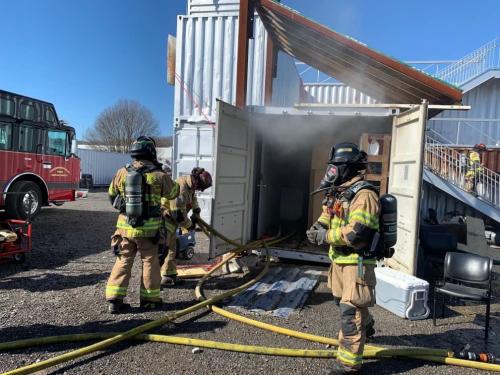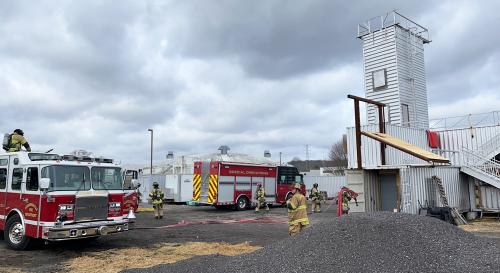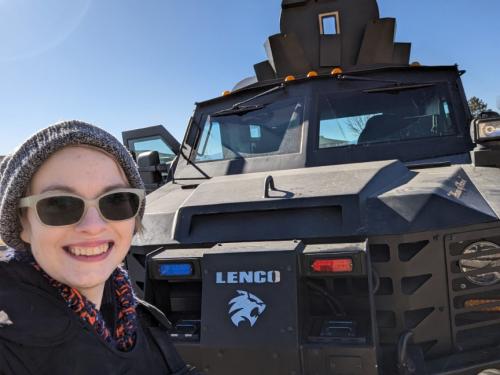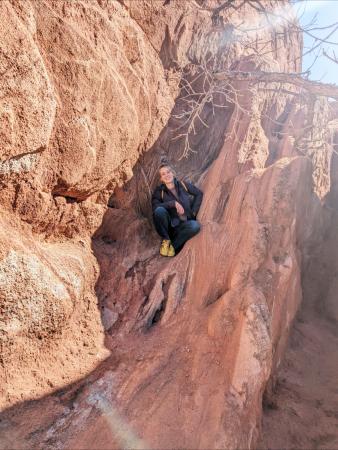LEJA Internship Opportunities Span the Globe for Career Training
April 4, 2023

WIU senior Keegan Cash
[Download Print-Quality Image]
MACOMB, IL – When it comes to internships for students in Western Illinois University's School of Law Enforcement and Justice Administration, the opportunities are as varied as the career fields the academic programming offers.
As students progress through their degree plan, they develop interests in specific areas, whether it be criminal justice, emergency management, fire science, Homeland Security, probation, corrections, or moving on to graduate or law school studies. At the end of their undergraduate studies, students typically wrap up their chosen degree with an internship in locations as near or far as they can imagine.
The WIU faculty member guiding those internship opportunities is LEJA Instructor Glen Schwartz, who serves as the program's internship coordinator. Schwartz is a retired Illinois State Police commander, who has taught criminal investigations at Western since 2011, and who has developed a network of internship opportunities that is built on past relationships, including alumni connections.
"We have more than 3,000 agencies we have worked with and continue to work with," said Schwartz. "These agencies know we produce good, quality graduates."
Schwartz works with WIU's undergraduate students preparing for internships to determine the best fit for their interests and skills.
"We work together," he said. "They typically have an idea about where they want to go. This is an opportunity to gain experience and observe a chosen profession to see what they are getting themselves into."
The LEJA internship programming began in 1969, as a way to interest students in developing into law enforcement leaders within the profession. The internship sites are located across the state, nation, including most every state at one point, and around the world.
One of the facets of working with interns and eventual graduates of the LEJA program, Schwartz said, is how they look out for each other and develop a private network and become life-long friends, which is "neat to see as they begin working in the real world."
"When it comes time to apply the knowledge they have gained in the classroom, they have a realistic perception of the real world challenges and they can hit the ground running," he said. "This program also gives agencies a new, eager face for them to help mold into professionals, which can lead to jobs for our graduates."
Many times, after graduation from WIU, students seek full-time employment with the agencies they intern with. Positions range from law enforcement agencies of all levels and sizes, probation, corrections, and parole, game wardens, law schools and law firms, department of children and family services offices, and loss prevention and private security, to include professional sports teams.
Schwartz oversees each internship experience and maintains contact with WIU students throughout their internship semester.
"We expect our students to follow regulations and maintain professionalism to make themselves and WIU look good," he said. "There is an application and interview process and they are competing with fellow students and those from other universities. The experience lets them work side-by-side with professionals. I also like hearing the stories of what the interns are working on and seeing photos of them working in the field."
A typical semester-long internship for WIU students is 360 hours of unpaid work; or nine weeks of 40 hours per week. The LEJA program also offers a classroom option to students who are not interested in a hands-on internship. Interning Students complete assignments throughout the semester, as well as submitting a final paper.
This semester, WIU senior Keegan Cash, a fire protection services major, of Big Bear, CA, is interning with the Hendersonville (TN) Fire Department.
Cash said he initially "tagged along" with the department's newest recruit class and participated in training with those firefighters.
"The first two weeks we took an Emergency Medical Responder course to receive our state EMS licenses," he said. "I was able to use this course to help me practice for my EMT certification test the following week. After EMR, we traveled around the six different stations to train with fire companies on fire operations from the state academy book. We went over firefighter safety and rescue, ropes, fire suppression and attack, fire prevention, Hazmat, and many other skills you will need to know as a firefighter. I trained with the group until week six, where they then left for the state academy."
Most recently, Cash has been riding along with fire crews for eight-hour day shifts. He helps at emergency scenes in a variety of ways, including grabbing tools and helping stabilize the scene.
"On medical calls, since I recently became certified as an EMT, the firefighters allowed me to run the medical calls including patient assessment, any interventions needed, and transfer of care to the medics once they arrived," he said. "If we weren't running calls, my duties consisted of familiarizing myself with the apparatus and tools, keeping the station clean and maintained, and assisting in any miscellaneous work needed."
After meeting with Schwartz about choosing an internship, Cash said he reached out to Hendersonville Fire Chief Scotty Bush to inquire about completing an internship. He said Schwartz helped him plan his program and fill out the fire department's paperwork to make sure he was able to participate in activities.
"When it comes to how WIU helped me prepare for my internship, I'd have to say the way my fire professors didn't just teach me what the right answer is, but why that's the right answer," Cash said. "I learned in my internship that every call you respond to is different than the last; there is no rulebook. If you get that tunnel vision, and only focus on one aspect of the situation you're dealing with, you might miss something big. My professors at WIU taught me that adaptability is a crucial part of the job. If you are able to understand why a fire is reacting a certain way or why a patient is experiencing certain symptoms, you will be able to provide much more assistance and keep yourself, and others around you much safer by being adaptive."
WIU senior Kat Black, an LEJA major and sociology and fire science minor, of Moweaqua, IL, is an intern this summer with the Pueblo (CO) Police Department. She said she chose the region because she has an interest in living in Colorado in the future.
Black is also considering graduate school before beginning her career.
"I first picked some departments in Colorado and researched crime levels, and where departments are that do a good job of keeping crime low," she said.
On an average week, Black said, she does ride-alongs with city police officers and has worked with a department team specializing in thefts, as well as the bomb squad. She has also helped with the department's Polar Plunge fundraising event.
"I'm getting to know the officers and how the department operates and I'm figuring out if this is where I want to be," she said.
Black transferred to WIU's LEJA program after graduating from Richland Community College in Decatur, IL. During her studies, she has also become a certified phlebotomist, had advanced training in probation and parole and became a certified telecommunicator.
One of the reasons Black said she chose WIU to further her education is because the University's LEJA professors "go above and beyond" for their students, as well as the University's affordability. She credits WIU Assistant Professor Glenn Daugherty's classroom response to COVID teaching as one reason she was able to finish her degree.
"Professors like that helped me learn things that I needed for my career," she said.
Black also said Schwartz has been an excellent resource during her internship.
"He is very encouraging," she said. "I need someone who thinks critically while doing this."
This semester, Black said, she has been refining her definition of a dream job and learning the duties of a police officer, especially in working with the community and building trust between the department and the public.
For more information about the variety of academic programming available in WIU's School of LEJA, visit wiu.edu/LEJA.
Posted By: Jodi Pospeschil (JK-Pospeschil@wiu.edu)
Office of University Communications & Marketing




Connect with us: